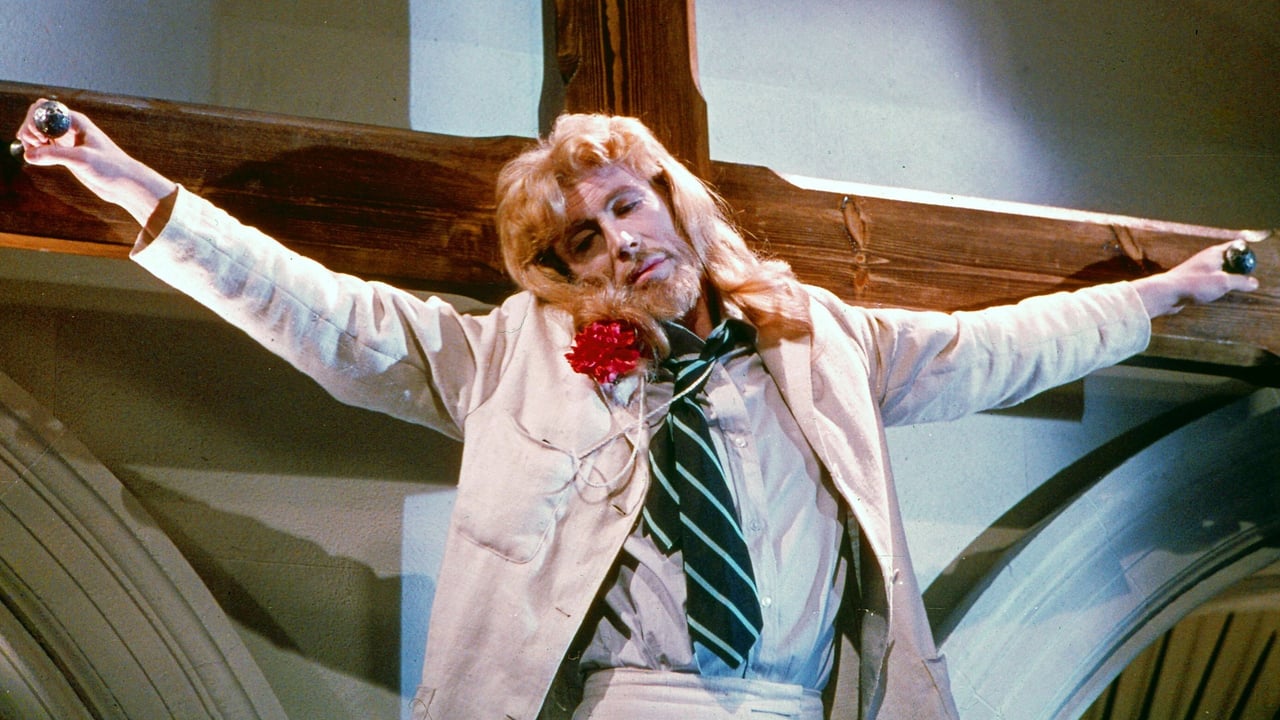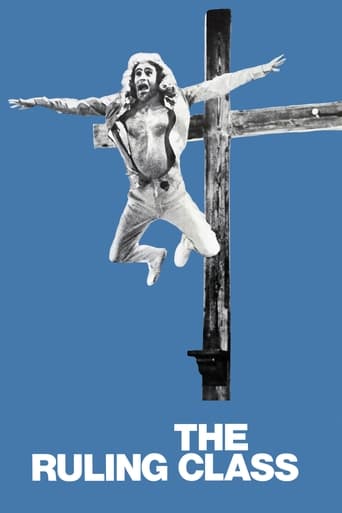



That was an excellent one.
Sorry, this movie sucks
People are voting emotionally.
Excellent and certainly provocative... If nothing else, the film is a real conversation starter.
View MoreThe Ruling Class (1972)This is a peculiar, long, hilarious and tedious movie, depending on your taste and probably your age. Parts of it have always made me perk up and laugh, but it works the same theme (of the exhaustion of the old British ways) to death.Peter O'Toole lets it all hang out here, for sure, as Jesus, and as a crazed new British Lord (including a famous final section where he gives a speech to the House of Lords, which is filled with cobwebbed skeletons). It's not really supposed to be haunting or scary, but it's slightly gruesome comedy is pointed, for sure. And funny. If you don't laugh or at least give a crooked smile to the battle between two men who think they are god--O'Toole as the Jesus God and Nigel Green as an Old Testament God, and the Electric Messiah (both). It's crazy and crazed and yet what else do you expect?Someone said it perfectly when they called it a "comedy with tragic relief." O'Toole won an Oscar for his efforts (and he played his part for free). The American version of the movie has 6 minutes missing, though probably the wrong 6 minutes. A good editing might remove an hour and have a faster and more punchy movie. Still, it is what it is, and there's nothing quite like it.
View MorePeter O'Toole becomes the 14th Earl of Gurney, head of one of the richest and most powerful families in England. He assumes the title upon the death of Harry Andrews. When Andrews is buried, the Reverend Alistair Sims comes to the family seeking reassurance that Andrews' having been found dead, hanging by a noose in his own bedroom, doesn't indicate suicide. After all -- burial in sacred ground and all that. Sims is told indignantly, good heavens, the man was wearing a cocked hat, underpants, and a ballet dress -- does that sound like suicide? The rest of the family carry on an intense discussion but every once in a while they're interrupted by a shriek from Sims, to whom realizations come only slowly, and one at a time. "Cocked HAT?" And, later, "Underpants?" And finally, "BALLET DRESS?" It doesn't help that the slightly nutty Andrews, who was in the habit of strangling himself while reciting patriotic speeches, is dead. O'Toole, as his successor, is downright loco.O'Toole believes he is Jesus Christ. He certainly LOOKS the part. He is given long flowing hair with bangs, and a short beard, and with his blue eyes looks exactly like a painting on a post card sold in one of those tourist shops around the Vatican.But if his appearance is bizarre, his beliefs are even worse. He thinks God is love. What an insane idea. In the end another madman changes O'Toole's engrams and turns him into "Jack," his real name. Unfortunately he becomes the wrong person, Jack the You-Know-What. He gives a speech in Parliament praising capital punishment, torture, and so forth, and receives a rousing applause from the assembly. Love doesn't sell. Cruelty wins by a mile.O'Toole described this as a comedy with tragic relief, and that's about it. It presents a pretty shabby picture of human nature, beneath the laughs, or the attempts at laughter, which too often evoke puzzled frowns.Peter Barnes' play was staged in 1968 and presumably written a year or two earlier, a period when the voice of iconoclasm was heard throughout the land, as the 14th Earl of Gurney might have put it before he was electrified.The late 60s were a time of revolution, first outrageously irrational and then violent. The movie may look dated because it so accurately reflects that evolutionary path. Of course some of its zingers never lose their sting. How does O'Toole know he's God? "Because whenever I pray, I find I'm talking to myself." Skewered here are class distinctions, snobbery, religion, love, and anything else you can think of, down to the roots of our cultural being. The problem is that it doesn't seem all that funny to me, not in 2010. There are so many shouts, so much gesticulating, dances that come out of nowhere, an immaterial sequence involving "La Traviata," the cast breaking into old songs like "My Blue Heaven," overacting generally, winks at an audience that already recognizes the joke.Since it's a whimsical, comic, tragic fantasy it needn't stick too close to reality -- actually, it mustn't -- and it doesn't. There's nothing at all amusing about paranoid schizophrenia, which is about the most terrifying form of the disorder. And if you bring together two patients who both believe they are Jesus Christ, you don't get the electrifying confrontation the movie gives us. The psychologist Milton Rokeach already brought THREE patients with the same delusion together and their eyes remained glazed. They were as emotionally flat as always when they were introduced. One commented, "Oh, so you're a cemetery rerise?" All the performances are fine. O'Toole's role is a difficult one but he handles it very well. Who can count the times he's played a madman? It's the would-be disturbing script and the in-your-face direction that keeps this from being the black comedy it wants to be. Sometimes subtlety plays better, as in "Dr. Strangelove," a product of the same period with a similar structure.
View MoreBack in 2001, The Criterion Collection saw fit to add "The Ruling Class" (1972) to their catalog; which means there is now a good print available in the correct aspect ratio, one that includes the entire original release running time of 154 minutes. It also means that "The Ruling Class" is now regarded in film circles as a "significant" movie. Of course almost any film student will tell you that "significant" is not necessarily synonymous with entertaining, critically acclaimed, or well-made.So if you are considering a purchase or have just had a confused post-purchase viewing experience the following discussion may prove useful. This is a British film, one I originally watched on the BBC a few months after its release. It was neither a critical success (mixed reviews) nor a box office sensation and hitting the BBC so soon after a theatrical release back then was not much different from going direct-to-video today.It was a counter-culture film, and much of my original enjoyment came from the obvious tweaking of certain cultural and political institutions. Much of this stuff has lost its power and appeal over the years.It has a lot of expressionistic and allegorical elements; this sort of stuff was (and is) relatively rare in an English language film and probably accounts for much of the current cult status of the film. The black comedy aspect of these elements has held up very well and you will understand the film better and enjoy it more if you don't take it literally.Jack, the 14th Earl of Gurney (Peter O'Toole), has recently inherited the family title and a place in the House of Lords of the British Parliament. The story actually begins with a cheerfully provocative black comedy sequence as his father, the 13th Earl (Harry Andrews), accidentally hangs himself while performing what is apparently a long-standing self-pleasuring ritual.Jack believes himself Jesus Christ and his family believes that they can get their hands on the estate once he produces an heir. Their idea being to have him committed and then become guardians of the child. Carolyn Seymour plays his uncle's mistress who is brought in to marry Jack. Her character throws a wrench in the works by falling in love with her new husband. Other than Jack, Seymour's character is the only one that undergoes any real change during the course of the film and she sells this transformation quite nicely while also providing one of the best striptease sequences you are likely to stumble across in a mainstream movie.As already noted the running length is 154 minutes, that's about the length of two movies and if the film were being produced today I suspect that it would be done as two separate films. Indeed it is really two stories with each having an entirely different tone. About midway through the film, the Jesus version of the 14th Earl is replaced by a Jack the Ripper version. In the process a farcical and relatively light-hearted black comedy is instantly transformed into a much darker story. Black comedy gives way to dark fantasy and hallucinations as the wheels fall off the story until a visually stunning ending.The 1972 theme being essentially that being forced to conform to the ritualistic practices of upper class British society produces a monster. That not being able to "do your own thing" unleashes a monster on the world. Unfortunately the basic cause and effect of this whole process is glossed over and one is left wondering why the film you have been watching has been replaced with something entirely different and far less entertaining.O'Toole underplays his two characters, don't expect a lot of Gary Oldham type excess. Jesus is more a mild narcissist than a booming holy roller. Jack (the Ripper) is much better mannered but obviously smoldering beneath his polite exterior.The laughs mostly come from the discomfort of Jack's family and from Alastair Sim's apoplectic bishop and Authur Lowe's collectivist butler who abuses the family with a "Benson" type frankness.There are two great musical sequences, a hunt club performance of "Dem Bones" (a homage to "The Prisoner") and the climatic scene in the House of Lords (a surreal montage of decay to the music of "Pomp and Circumstances" and "Onward, Christian Soldiers").Then again, what do I know? I'm only a child.
View MorePeople who've only seen Peter O'Toole in his dramatic roles may find it hard to believe he's just as talented in comic roles. In The Ruling Class he plays Jack Gurney, the 14th Earl of Gurney, who returns home to take over the estate after his father dies in a ridiculous role-playing sex game. Trouble is, Jack's a paranoid schizophrenic who believes he's God, so his uncle tries to have him married to get a healthy heir or institutionalized for the sake of appearances. For as the movie shows, it's not the eccentric behavior that's troubling, for every character in this movie is clearly off his mind one way or the other; it's keeping up appearances in society that matters.As it is, The Ruling Class is a sharp, ruthless and darkly funny indictment of British high society, wasteful, irresponsible, prejudiced, living in a world apart and yet presiding over the future of all citizens.The movie is based on a play by Peter Barnes and displays the Brits' usual talent for wit, dark humor and world play. Some scenes are unforgettable gems of humor. It also has several musical episodes which disturbingly fit the mood of the movie.However I don't think they manage to sustain the humor evenly throughout the movie, and there are some dull bits and others not as funny as they should be. With the movie clocking in at 154 minutes, it's difficult to keep the jokes great for so long. Nevertheless it's a satisfying movie with a great ending. Any movie that ends with Peter O'Toole thinking he's Jack the Ripper is clearly special and well worth watching.
View More